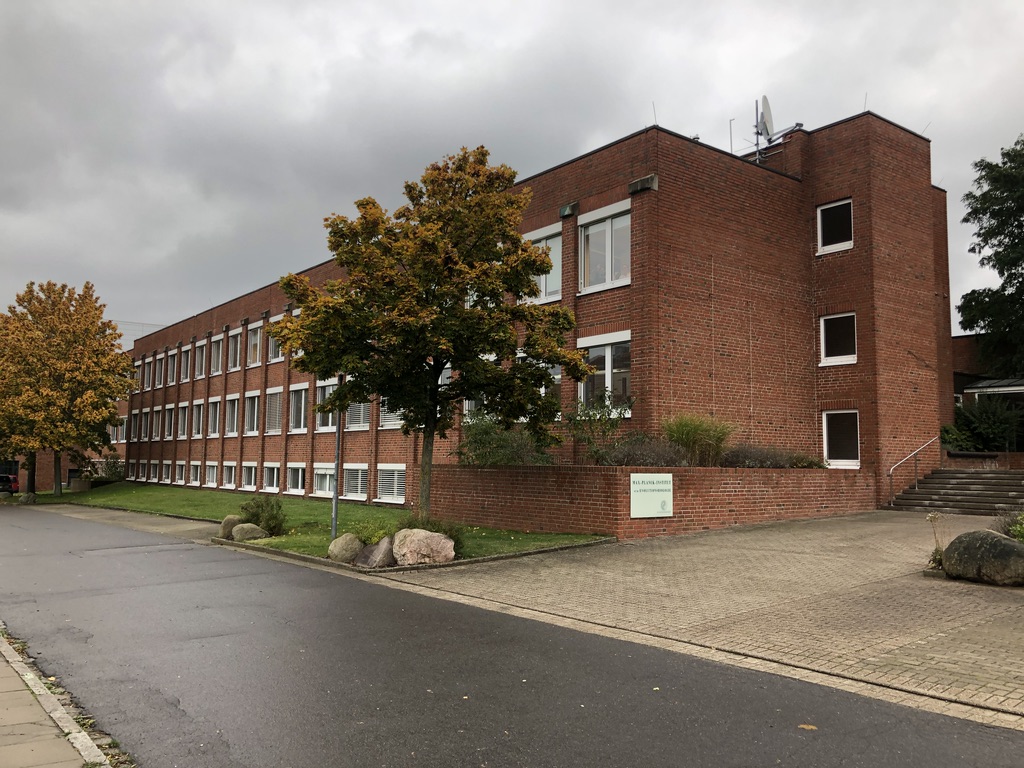Max Planck Institute for Evolutionary Biology on:
[Wikipedia]
[Google]
[Amazon]
 The Max Planck Institute for Evolutionary Biology is a German institute for
The Max Planck Institute for Evolutionary Biology is a German institute for
History
on official website It was renamed again as Max Planck Institute for Evolutionary Biology in 2007, marking a change of the research focus towards
Evolutionary Theory
(Arne Traulsen)
Microbial Population Biology
(Paul Rainey)
Personal site with views of the Biological Station at Plon
{{Authority control
 The Max Planck Institute for Evolutionary Biology is a German institute for
The Max Planck Institute for Evolutionary Biology is a German institute for evolutionary biology
Evolutionary biology is the subfield of biology that studies the evolutionary processes (natural selection, common descent, speciation) that produced the diversity of life on Earth. It is also defined as the study of the history of life ...
. It is located in Plön
Plön (; Holsatian: ''Plöön'') is the district seat of the Plön district in Schleswig-Holstein, Germany, and has about 8,700 inhabitants. It lies right on the shores of Schleswig-Holstein's biggest lake, the Great Plön Lake, as well as o ...
, Schleswig-Holstein
Schleswig-Holstein (; da, Slesvig-Holsten; nds, Sleswig-Holsteen; frr, Slaswik-Holstiinj) is the northernmost of the 16 states of Germany, comprising most of the historical duchy of Holstein and the southern part of the former Duchy of Sc ...
, Germany.
History
The institute was founded by German zoologistOtto Zacharias
Emil Otto Zacharias (January 27, 1846, Leipzig – October 2, 1916, Kiel) was a German zoologist and plankton researcher, asd well as popularizer of science and journalist.
Life
After a training as a mechanic, Otto Zacharias immersed himself ...
as ''Hydrobiologische Station zu Plön''. Working in Italy in the 1880s, Zacharias was inspired by the highly recognised Stazione Zoologica
The Stazione Zoologica Anton Dohrn is a research institute in Naples, Italy, devoted to basic research in biology. Research is largely interdisciplinary involving the fields of evolution, biochemistry, molecular biology, neurobiology, cell bio ...
in Naples
Naples (; it, Napoli ; nap, Napule ), from grc, Νεάπολις, Neápolis, lit=new city. is the regional capital of Campania and the third-largest city of Italy, after Rome and Milan, with a population of 909,048 within the city's adm ...
, founded in 1870 by Anton Dohrn
Felix Anton Dohrn FRS FRSE (29 December 1840 – 26 September 1909) was a prominent German Darwinist and the founder and first director of the first zoological research station in the world, the Stazione Zoologica in Naples, Italy. He worked ...
, to set up the first "Biological Station" for freshwater research in Germany. He secured financial support from the Prussia
Prussia, , Old Prussian: ''Prūsa'' or ''Prūsija'' was a German state on the southeast coast of the Baltic Sea. It formed the German Empire under Prussian rule when it united the German states in 1871. It was ''de facto'' dissolved by an e ...
n government and several private individuals to establish it on Großer Plöner See
The Großer Plöner See ("Great Plön Lake") or Lake Plön ("Plöner See", ) is the largest lake (30 km²) in Schleswig-Holstein, Germany. It is located near the town of Plön. Its main tributary, as well as its main outflow, is the River S ...
in 1891, as a private research institute.
As the director, Zacharias published research reports from 1893 on the Station's activities, which were recorded from 1905 in the Archives of Hydrobiology. In so-called "summer schools" Zacharias trained teachers and laity interested in working with the microscope
A microscope () is a laboratory instrument used to examine objects that are too small to be seen by the naked eye. Microscopy is the science of investigating small objects and structures using a microscope. Microscopic means being invisi ...
.
It became part of the Max Planck Society
The Max Planck Society for the Advancement of Science (german: Max-Planck-Gesellschaft zur Förderung der Wissenschaften e. V.; abbreviated MPG) is a formally independent non-governmental and non-profit association of German research institutes. ...
in 1948, and was renamed in 1966 as the Max Planck Institute of Limnology.on official website It was renamed again as Max Planck Institute for Evolutionary Biology in 2007, marking a change of the research focus towards
evolutionary biology
Evolutionary biology is the subfield of biology that studies the evolutionary processes (natural selection, common descent, speciation) that produced the diversity of life on Earth. It is also defined as the study of the history of life ...
.
Departments
* Evolutionary Genetics (Diethard Tautz
Diethard Tautz (born 17 August 1957 in Glonn) is a German biologist and geneticist, who is primarily concerned with the molecular basis of the evolution of mammals. Since 2006 he is director at the Max Planck Institute for Evolutionary Biolog ...
)
Evolutionary Theory
(Arne Traulsen)
Microbial Population Biology
(Paul Rainey)
Research groups
*Behavioural Genomics (Miriam Liedvogel) *Biological Clocks (Tobias Kaiser) *Dynamics of Social Behavior (Christian Hilbe) *Evolutionary Cell Biology (Javier López Garrido) *Craniofacial Biology (Marketa Kaucka ) *Environmental Genomics (Eva Stukenbrock) *Antibiotic Resistance Evolution (Hinrich Schulenburg) *Evolutionary Genomics (John Baines) *Evolutionary Immunogenomics (Tobias L. Lenz)References
External links
*Personal site with views of the Biological Station at Plon
{{Authority control
Evolutionary Biology
Evolutionary biology is the subfield of biology that studies the evolutionary processes (natural selection, common descent, speciation) that produced the diversity of life on Earth. It is also defined as the study of the history of life ...
Earth science research institutes
Education in Schleswig-Holstein
Educational institutions established in 1891
Evolutionary biology
Genetics in Germany
Limnology
Plön
1891 establishments in Germany